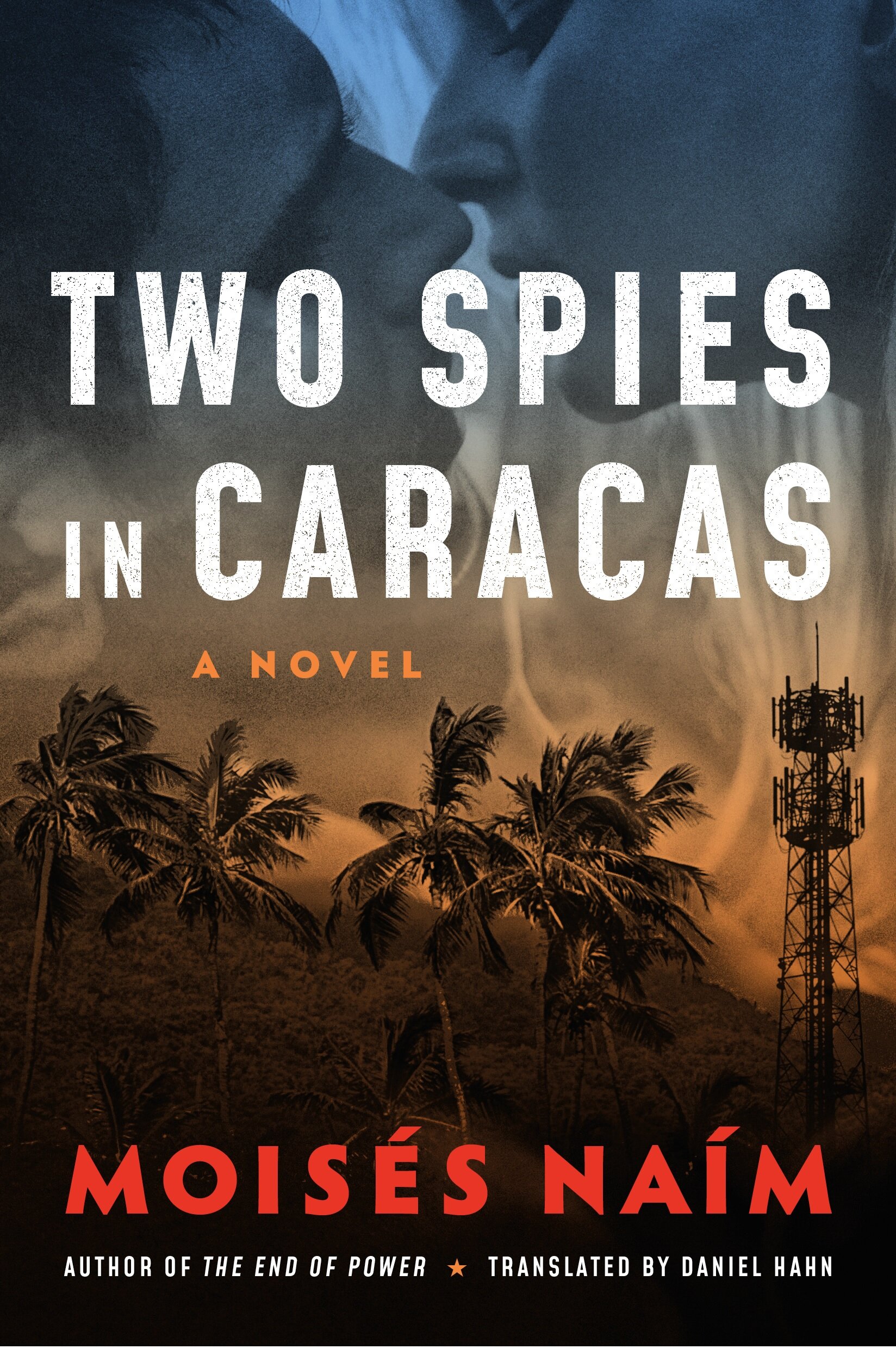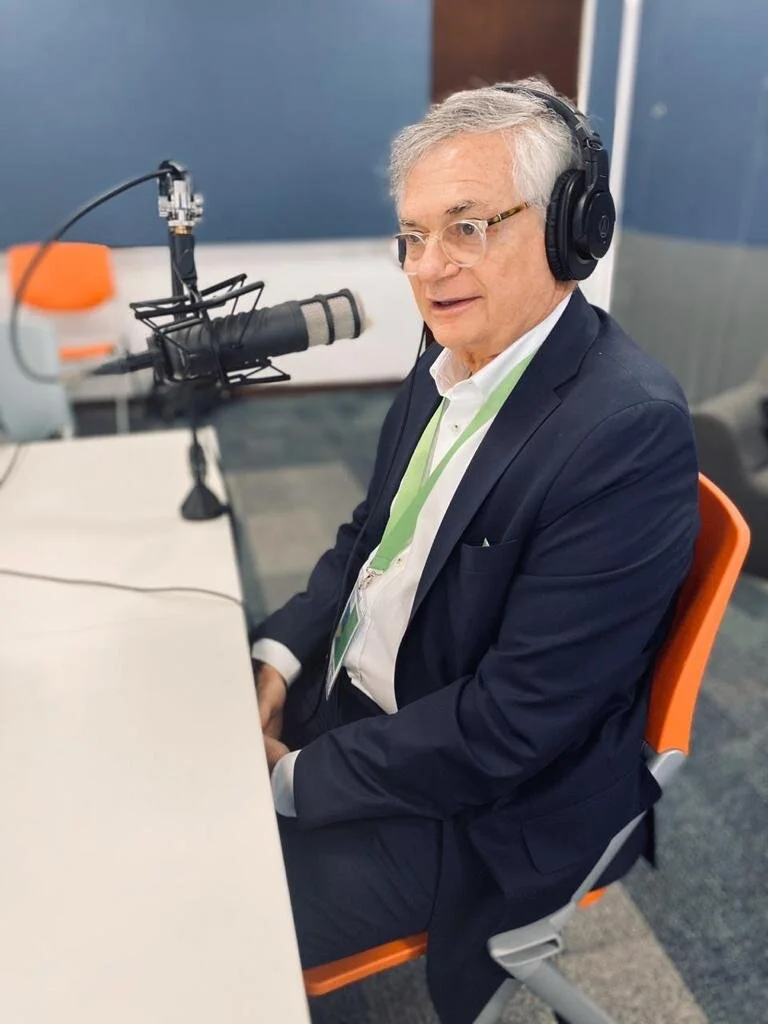Other Media
Search by type of media
David Wood / Dw2
Each of these books gave me plenty to think about. I’m grateful in every case for the effort and inspiration of the authors.
But one of these books stands out as being even more impressive and impactful than all the others.
It’s The Revenge of Power, by Moisés Naím.
Brian Winter / America’s Quarterly
It’s been a difficult decade for much of Latin America, but there are also some causes for optimism. As 2022 draws to a close, Moisés Naím, one of the region’s most respected and followed political commentators, provides an overview of where things stand. In a conversation with Brian Winter, Naím discusses the struggles of democracy, as well as recent developments in Venezuela, his home country. Naím is the author of the book The Revenge of Power, which chronicles the rise of autocratic leaders in recent years and was recently named by the New Yorker magazine as one of the best books of 2022. He is a Distinguished Fellow at the Carnegie Endowment for International Peace, a columnist for El País and a member of Americas Quarterly’s editorial board.
Frank Racioppi / Medium
Rating: Four out of Four Voting Machines
Ease Of Reading: Well-constructed and lucid argument about the resurgence of authoritarianism in the world today. Length:328 pages.
When To read: Go to YouTube and search for the clip where Donald Trump says being President for life is a good idea and then realize our democracy is in peril.
Moisés Naím, the author, has some serious street cred. He is a Distinguished Fellow at the Carnegie Endowment for International Peace. In 2013, the British magazine Prospect listed Naím as one of the world’s leading thinkers. In 2014 and 2015, Naím was ranked among the top 100 influential global thought leaders by Gottlieb Duttweiler Institute (GDI) for his book The End of Power.
Gideon Rachman / Financial Times
The Revenge of Power: How Autocrats Are Reinventing Politics for the 21st Century
By Moisés Naím
St Martins Press
£23.99/$29.99
A leading international affairs journalist takes on one of the big political puzzles of our era — why is authoritarianism making a comeback? Naím skilfully combines reportage with social-science research to identify the new tactics used by authoritarians, highlighting the three “P”s: populism, polarisation and “post-truth”.
Adam Gopnik / The New Yorker
Meet the new boss, same as the old boss, as the song has it—and now let us meet the new dictators and see whether they are the same as the old. Are the authoritarians who grace, or disgrace, our world, from Recep Tayyip Erdoğan to Vladimir Putin, more like or unlike their twentieth-century predecessors? This is not an academic question—well, actually, it is an academic question, but a good kind of academic question. Its answer has consequences for our actions.
Didi Kuo / The Washington Post
In “The End of Power,” Moisés Naím argued that power was decaying. The modern era was characterized by fluidity, by centrifugal forces that redistributed power away from long-standing centers of authority. Because of three revolutions — the more revolution, the mobility revolution and the mentality revolution — power was becoming easier to get but harder to maintain. The result was a tense combination of progress and instability.
Ari Shapiro / Great Podversations
Journalist and author Moisés Naím discusses his book, "The Revenge of Power: How Autocrats Are Reinventing Politics for the 21st Century" with radio host Ari Shapiro. Moisés Naím is an internationally-syndicated columnist and best-selling author. He is the chief international columnist for El País and La Repubblica, the largest daily newspapers in Spain and Italy. His columns have been published in The New York Times, The Washington Post, Bloomberg Businessweek, Newsweek, Time, Le Monde, El Estadão, and Berliner Zeitung. Dr. Naím is a Distinguished Fellow at the Carnegie Endowment for International Peace in Washington, DC. He is the founder and Chairman of the Board of the Group of Fifty (G50), which brings together top-flight progressive Latin American business leaders, and is a member of the board of directors of several global companies. Ari Shapiro has been one of the hosts of All Things Considered, NPR's award-winning afternoon newsmagazine, since 2015. Shapiro has reported from above the Arctic Circle and aboard Air Force One. He has covered wars in Iraq, Ukraine, and Israel, and he has filed stories from dozens of countries and most of the 50 states. Shapiro's reporting has been consistently recognized by his peers. He has won two national Edward R. Murrow awards, and additional awards from the Columbia Journalism Review, The American Bar Association, and the American Judges Association.
Yascha Mounk / Persuasion
Moisés Naím is a Distinguished Fellow at the Carnegie Endowment for International Peace and a member of the Persuasion board of advisors. He has served as Minister of Trade and Industry for Venezuela, Executive Director of the World Bank, and editor-in-chief of Foreign Policy magazine. His latest book is The Revenge of Power.
Jake Whitney / The Progressive
In his new book, The Revenge of Power: How Autocrats Are Reinventing Politics for the 21st Century, Moisés Naím contends that authoritarian power is on the rise globally, and he admonishes citizens to recognize and confront it.
Gideon Rachman / The Financial Times
A lot of contemporary political commentary centres around the same disturbing puzzle — why is authoritarianism making a comeback? Moisés Naím is a US-based commentator who originally hails from Venezuela, which makes him well placed to understand the dangerous interplay between populism and authoritarianism. In The Revenge of Power (St Martin’s Press, £23.99), he skilfully combines reportage with social-science research to identify and analyse the three “P”s driving the global resurgence of authoritarianism: populism, polarisation and “post-truth”.
Manuel Roig-Franzia / Washington Post
One surreal night in 2010, a team of forensic specialists under orders from Venezuela’s mercurial president, Hugo Chávez, lifted a coffin lid on live television.
Inside lay the remains of Simón Bolívar, the famed military leader and political icon who had freed vast stretches of South America from Spanish rule in the early 1800s. Chávez, who idolized the man known as El Libertador — The Liberator — had become fixated on proving a conspiracy theory that Bolívar had not died of tuberculosis, as had been widely accepted by historians, but rather had been poisoned by a confederacy of enemies that included Colombian aristocrats, the king of Spain and the president of the United States, Andrew Jackson.
Pat Zi / Joy on Paper
It was such an honor to talk to Dr. Moisés Naím.
I have spoken a many global bestselling authors, many celebrities, and even the Poet Laureate. But never one of “world’s leading thinkers’ as he is known. I felt like I should have addressed him as Dr. Naím, but he was so gracious and so I got on a first time name with this great man. After all, as he pointed out, he is a first time novelist….and what a novel! Two Spies in Caracas is a powerful thriller that takes readers into the turmoil of a collapsing Venezuela.
It harkens back to the best of Helen McInnes who knew how to write about spies, romance, and political intrigues.
In one of history’s most dangerous revolutions when Hugo Chavez led a coup against the Venezuela government, two rival spies are pitted against each other. Cristina Garza works for the CIA. She has two goals: help stabilize the oil reserves and eliminate Cuba’s influence. At the same time Iván Rincón of Cuba’s Intelligence Directorate is determined to neutralizing any American agents. But soon in the dangerous streets of Caracas Iván and Cristina are caught in a tangled web of lies and deceits — and shifting alliances as they play a game of espionage and murder.
Moisés Naím is not only a great thinker…but a great novelist.
You will love this book!
State of the World 2021 Conference : Struggle for Democracy
The world is at a crossroads as the coronavirus pandemic and its impact on the global economy have combined with increasing polarization and highly charged elections. At the same time, the unrelenting desire of people around the globe to live in freedom offers hope for democracy and human rights.
Hay Festival in Cartagena Digital 2021 / YouTube
"The book tries to show how paradoxical meritocracy is. It is transformed by being used through politics and its dark side towards inequality.
The remedy is to remind the successful that the position of the family or nation where they were born allowed them to be successful. Humility is the antidote to the arrogance of meritocracy".
Michael Sandel's reflection and his book The Tyranny of Merit in conversation with Moisés Naím.
Peter Schechter and Muni Jensen / Altmar Podcast
Guest: Moisés Naím, internationally-syndicated columnist, best-selling author, and TV host
Was the U.S. Capitol assault an attempted coup? Yes – but what comes next matters more.
The storming of the U.S. Capitol on January 6 was a national disgrace that upended America’s predictably peaceful transitions of power. It also unleashed widespread debate over classification as a coup – or if the attack was a riot, uprising, and insurrection – as U.S. citizens received a crash course on Latin America’s history of “self-coups” and worldwide assaults against democracy.
Host Jenn White interviews Moisés Naím, Nancy Youssef & Dan Diamond / The 1A Show
President Donald Trump and First Lady Melania Trump tested positive for coronavirus at a time when the nation was still reacting to recent revelations about his tax returns and the presidential debate. Protests have erupted in Venezuela over power cuts and a lack of fuel and drinking water. And the global death toll from COVID-19 crossed one million.
Host Jenn White interviews Moisés Naím, Emily Tamkin & Robert Moore / The 1A Show
Saudi Arabia has limited the number of people allowed to make the annual hajj pilgrimage due to coronavirus. Hajj typically draws up to 2.5 million Muslims from across the globe, but this year only 1,000 will be allowed. And the Palestinian Liberation Organization is calling for justice after Israeli police shot Ahmed Erekat, a 27-year-old Palestinian man.
George Looker & Elias Papaioannou / London Business School
How much of an impact is COVID-19 going to have on the world? Elias Papaioannou, Professor of Economics at London Business School and Academic Director of the Wheeler Institute for Business and Development was joined in conversation with Moisés Naím, an internationally-syndicated columnist and best-selling author, including The End of Power, as well as Venezuela’s former Minister of Trade and Industry, director of Venezuela’s Central Bank, and executive director of the World Bank, to discuss how the Coronavirus pandemic is going to impact the geopolitical landscape.
Tom Carver / Brink News
The latest economic data from the IMF suggests that coronavirus and the subsequent lockdowns will cause the global GDP to shrink by at least 3% this year. To get some insight into whether we might expect a quick or long recovery from that, BRINK turned to Moisés Naím, distinguished fellow at the Carnegie Endowment for International Peace, and chief international columnist for El País, Spain’s largest newspaper.
In the early 1990s, Naím was Venezuela’s minister of trade and industry, director of Venezuela’s Central Bank and executive director at the World Bank. BRINK’s executive editor, Tom Carver, began by asking Naím if he thought this crisis was different to anything that the global economy had had to face before.
Paul Laudicina / Global Business Policy Council at Kearney
Host Paul Laudicina interviews Moisés Naím, author of “The End of Power.” They discuss how leaders around the world are responding to the pandemic and the new realities that are emerging: a demand for truth, a need for collaboration, and a push for honest leadership.
View our global economic outlook here. Coronavirus: A World Transformed is produced by the Global Business Policy Council at Kearney, a think tank deciphering today’s biggest changes and their effects on global business. Learn more at kearney.com/gbpc
Carnegie Endowment for International Peace
With well over 870,000 confirmed infections and 40,000 deaths worldwide, COVID-19, the disease caused by the fast-spreading new coronavirus, has caused global havoc.
JMK / DemocracyParadox.com
Early in my life I was drawn to power to impose my ideas onto the world. It was only natural to believe leaders were able to change organizations, businesses or even geopolitics to their whim. But I found my implicit sense of power was entirely wrong. There is a tradeoff between authority and influence. Leadership becomes a trap where it is limited in its options by those who are supposedly led. Managers make concessions to their workers to maintain a productive atmosphere.
Fabio Cardosa / Rio Bravo
In this week's Rio Bravo Podcast, we talked with the writer Moisés Naím, one of the most read authors of today and a member of Carnegie Endowment. At the beginning of this decade, Naim published the book "O fim do poder" (The end of power), a work that addresses how new and multiple powers are changing traditional models in politics, business and the media. Since the book's release, a series of events have, on one hand, pointed to the acceleration of the transience of power and, on the other, marked the rise of new leaderships, beyond traditional politics and business. In the conversation, the writer comments on the consequences of these transformations in an environment that is increasingly hostile and complex. Speaking about the role of leaders in the coronavirus case, Moisés Naím says: "It is a matter that involves science, and it is better that doctors, statisticians and epidemiologists take care of it; and politicians should support scientists in this". The interview is in English. (Translated from original text).
The 1A Show / Host Todd Zwillich interviews Moisés Naím, Edward Luce & Amna Nawaz
This week, The Guardian reported that an encrypted message from a number used by Saudi royal Mohammed bin Salman allegedly contained a malicious file that infiltrated the cellphone of Amazon head Jeff Bezos. Now, United Nations experts are demanding that the United States investigate the alleged hack. This allegation comes as world leaders, including President Donald Trump, met in Davos, Switzerland for the World Economic Forum. And meanwhile, the leadership crisis in Venezuela continues. Secret service agents raided the offices of opposition leader Juan Guaidó, as the Trump administration leveled additional sanctions against the current government of President Nicolás Maduro. Plus, Prince Harry departs the United Kingdom.
UBS Center Zurich / YouTube
Populism is more than a political buzzword – it is a topic of highest sociopolitical relevance as it will form our society for years to come. We sat down with Moisés Naím to dig deeper.
Amanda Vanstone / Counterpoint
How can Australian universities ensure that any partnerships they have with Chinese universities don't also involve the Chinese military? They use the Chinese Defence University Tracker! Why is Latin America imploding and what happens after the protests there and in Hong Kong die down? What happens next? The bin chicken is considered to be a pest to most Australians but not to the Ancient Egyptians. For them they were so much more. Right now it seems as if most of the world has taken to the streets to protest.
Joshua Johnson & team / 1A Friday News Roundup – International
On Thursday, Israeli prime minister Benjamin Netanyahu was indicted on bribery, fraud and breach of trust charges.
It comes as the U.S. faces condemnation for changing its policy on the legality of Israeli settlements. Netanyahu’s main opponent, Benny Gantz, also said he was unable to form a government, and the country could be headed for a third election in a single year.
Amnesty International says that over 100 people have been killed in Iran, following country-wide unrest over increases in fuel prices. Reporting was not immediately available to corroborate the death toll — partially because the internet has been mostly shut down in Iran.
Meanwhile, at least six people have been killed in Bolivia as the country’s political crisis continues.
We unpack those headlines, and discuss how the impeachment inquiry is affecting American foreign policy, on this week’s global News Roundup.
Jen Psaki / The World Unpacked Podcast
Growing protests are raging across South America. From Ecuador to Bolivia to Venezuela to Chile, the region is experiencing the largest outbreak of unrest in decades.
What is prompting these protests? Why are they happening now? And what does it say about leadership in the region? To help us better understand, Moisés Naím joined Jen in the World Unpacked studio.
Go deeper: In a recent article for Foreign Affairs, Moisés explains why Latin America was primed to explode.
UBS Center Zurich / YouTube
Moisés Naím concluded that protests worldwide are just manifestations of the failure of established political parties. But democracies also cannot be just based on NGO's. And the solution to this is clearly not more populism.












